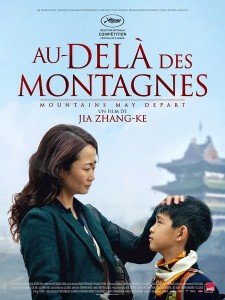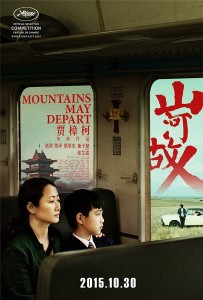Mountains May Depart
山河故人
China/France/Japan, 2015, colour, 1.33/1.85/2.35:1, 133 mins.
Director: Jia Zhangke 贾樟柯.
Rating: 5/10.
Weakly written saga of friendship across the years goes way off the rails in the final part.
Fenyang town, Shanxi province, northern China, Lunar New Year, 1999. Shen Tao (Zhao Tao), a schoolteacher in her mid-20s, is in love with miner Liang Jianjun (Liang Jingdong) but is also fancied by cocky young entrepreneur Zhang Jinsheng (Zhang Yi), owner of a garage. With the coal industry struggling, Zhang Jinsheng buys the mine where Liang Jianjun works and asks him to help run it. His condition is that Liang Jianjun leaves Shen Tao free to marry him. Liang Jianjun refuses and resigns his job, angering Zhang Jinsheng. Shen Tao appears not to understand why Zhang Jinsheng is upset, but finally she decides to marry him. Liang Jianjun refuses to attend her wedding and leaves Fenyang in search of a  new life. When Shen Tao later gives birth to a son, Zhang Jinsheng names him Daole (“Dollar”). In 2014, Liang Jianjun is working as a miner in Handan, southern Hebei province, and has a young wife, Xiaolu (Liu Lu), and a young son. Diagnosed with respiratory problems, Liang Jianjun moves with his family back to Fenyang and stays in his old family house. An old friend (Han Sanming) tells him he’s moving to Kazakhstan to work on a pipeline; he adds that Zhang Jinsheng and Shen Tao divorced, and the former now lives in Shanghai, where he’s a wealthy businessman. Xiaolu meets Shen Tao, and the latter visits Liang Jianjun, giving him money to pay for his medical treatment. She says Zhang Jinsheng won custody of their son, who is now attending an international school in Shanghai. She
new life. When Shen Tao later gives birth to a son, Zhang Jinsheng names him Daole (“Dollar”). In 2014, Liang Jianjun is working as a miner in Handan, southern Hebei province, and has a young wife, Xiaolu (Liu Lu), and a young son. Diagnosed with respiratory problems, Liang Jianjun moves with his family back to Fenyang and stays in his old family house. An old friend (Han Sanming) tells him he’s moving to Kazakhstan to work on a pipeline; he adds that Zhang Jinsheng and Shen Tao divorced, and the former now lives in Shanghai, where he’s a wealthy businessman. Xiaolu meets Shen Tao, and the latter visits Liang Jianjun, giving him money to pay for his medical treatment. She says Zhang Jinsheng won custody of their son, who is now attending an international school in Shanghai. She  herself is comfortable financially but very lonely. When Shen Tao’s father suddenly dies, Zhang Jinsheng sends Daole to Fenyang to attend the funeral. While Daole is staying with her, Shen Tao learns that Zhang Jinsheng and his family are emigrating to Melbourne, Australia. She gives Daole a set of keys to her home to remember her by. In 2025, Daole (Dong Zijian) is a young man living in A-City, Australia, and is attending Chinese classes given by Mia (Zhang Aijia), a Hong Konger who previously lived in Toronto and is now divorced. Daole doesn’t speak Chinese, doesn’t like to talk about his parents, and doesn’t get along with his father. Working for a Chinese restaurant, he happens to take a delivery to Mia’s flat – the start of a pupil-teacher friendship that later turns into more for both of them.
herself is comfortable financially but very lonely. When Shen Tao’s father suddenly dies, Zhang Jinsheng sends Daole to Fenyang to attend the funeral. While Daole is staying with her, Shen Tao learns that Zhang Jinsheng and his family are emigrating to Melbourne, Australia. She gives Daole a set of keys to her home to remember her by. In 2025, Daole (Dong Zijian) is a young man living in A-City, Australia, and is attending Chinese classes given by Mia (Zhang Aijia), a Hong Konger who previously lived in Toronto and is now divorced. Daole doesn’t speak Chinese, doesn’t like to talk about his parents, and doesn’t get along with his father. Working for a Chinese restaurant, he happens to take a delivery to Mia’s flat – the start of a pupil-teacher friendship that later turns into more for both of them.
REVIEW
An ambitious, three-part attempt to portray changing relationships among a small group of people across 26 years, Mountains May Depart 山河故人 falls victim halfway to a weak script that isn’t up to the job before totally going off the rails in the final section (set in 2024 Australia) with risible English dialogue and no idea how to create a sense of resolution. The artificial style of Jia Zhangke 贾樟柯 has relaxed over the years but the Mainland writer-director, now in his mid-40s and with seven features behind him, still has little grasp of long-form dramatic structure and how to create empathetic characters with real depth. That wasn’t such a problem in his last feature, the portmanteau A Touch of Sin 天注定 (2013), but in a long-spanned tale like Mountains the shallowness of his writing is laid bare.
Set, like Jia’s first two features, Xiao Wu 小武 (1997) and Platform 站台 (2000), in his hometown of Fenyang, Shanxi province, northern China, the film starts with a bang as a group of youngsters jive around during Lunar New Year 1999 to Pet Shop Boy’s anthemic version of Go West (a hit in China around the time). It’s a powerful metaphor for their dreams of the future and the country’s own aspirations as a new century is soon to dawn – and is continued in subsequent scenes as local schoolteacher Shen Tao (played with surprising verve by Jia’s regular muse, his wife Zhao Tao 赵涛) joyrides with two friends: dull but nice miner Liang Jianjun and cocky wannabe entrepreneur Zhang Jinsheng. Forced to choose between the two, Shen Tao finally opts for money and the future over reliability and the past, marrying Zhang Jinsheng and dumping Liang Jianjun. Fifteen years later, she’s middle-aged and wealthy but divorced and lonely, her only child now in Shanghai with Zhang Jinsheng. Nine years later, the son (named Daole/”Dollar” by his money-loving father) is an English-speaking, 20-something slacker in Australia who can’t get on with his father and enters into a May-September relationship with an Overseas Chinese teacher.
For a film whose Chinese title signifies the abiding ties of friendship despite differences, the script is amazingly profligate in the way it ditches characters as it goes along – the sickly Liang Jianjun, who needs expensive medical care, disappears after the second section, as does Shen Tao (surely the film’s emotional centre?) once the action moves to futuristic Australia. In their place, the script constructs no broader dramatic arc to carry the viewer along. The third section, lasting some 35 minutes, is almost a separate film, with an unrecognisable, half-dotty Zhang Jinsheng providing minimal character continuity (after disppearing during the second act) and a story that centres on his spoilt son’s unbelievable romance with a divorcee more than twice his age. A final cut back to a gracefully ageing Shen Tao, wistful in Fenyang, tries to complete the circle but by then it’s way too late.
The film is at its best in the first hour, with Zhao (usually cast in glum roles) refreshingly lively as the young schoolteacher and sinking her teeth into the thick Shanxi dialect. Wearing a signature red coat and rainbow-striped jumper – both almost luminous in the saturated photography – the 38-year-old actress is vital enough to overlook the fact she looks a tad too old to play someone in her mid-20s. Along with the equally lively Zhang Yi 张译 (the support-group leader in Dearest 亲爱的, 2014) as the cocky Zhang Jinsheng, and a quieter Liang Jingdong 梁景东 (Platform) as the taciturn Liang Jianjun, the opening section, running 55 minutes, promises that Jia may finally have broken through to a more natural, accessible style of film-making – even though occasional scenes still ring false and his use of privately shot video material from the era is an arty distraction.
Though more low-key, Zhao actually looks more at home in the second section, playing a lonely divorcee in her early 40s. And Jia still manages to keep his style generally accessible, despite a growing feeling that the characters aren’t really going anywhere. It’s the abrupt change of both scenery and focus in the Australian section that jolts the movie off the rails: apart from the squirmingly arch English dialogue, and a depiction of the future that’s all over the place (mobile phone mapping, but air tickets still booked by travel agents), hardly one minute is believable on an emotional level. Veteran Taiwan filmmaker Zhang Aijia 张艾嘉 [Sylvia Chang] does her best with the English dialogue, and gives her role some dignity, but young actor Dong Zijian 董子健, 21, who was a strong lead in high-school movie Young Style 青春派 (2013), can do little with the self-centred, unsympathetic role he’s been handed by the screenplay. Overall, Zhang, Liang and sometimes Zhao manage to generate some empathy for their characters, but in general there’s still too much cold calculation behind Jia’s writing and direction.
Jia’s regular d.p., Hong Kong’s Yu Liwei 余力为, creates an often stunning frame for the story, especially in the first section, with its crystal-clear look and saturated colours. The decision to use ever-more-wide aspect ratios for the three sections (1.33, 1.85, 2.35) is a cute idea but no more, as is the interpolation of documentary video footage here and there. Aside from Go West, emotive use is made of a 1990 Cantonese song sung by Hong Kong’s Ye Qianwen 叶倩文 [Sally Yeh] called Take Care 珍重, which sums up the idea of friendship and parting in a more moving way than the film itself.
The film’s Chinese title literally means “Old Friends Are Like Mountains and Rivers”, in the sense of the immutability of friendship. The faux-poetic English title is meant to convey the same idea in a different way. For the record, Mountains includes a pointless shock moment (like the spaceship taking off in Still Life 三峡好人, 2006) that is almost a trademark of the director: here, it’s a crashing plane that almost hits Shen Tao on a road one day. Really.
CREDITS
Presented by Shanghai Film Group (CN), Xstream Pictures (Beijing) (CN), MK Productions (FR), Beijing Runjin Investment (CN), Office Kitano (JP).
Script: Jia Zhangke. Photography: Yu Liwei. Editing: Matthieu Laclau. Music: Hanno Yoshihiro. Art direction: Liu Qiang. Costumes: Li Hua. Sound: Zhang Yang, Olivier Goinard. Visual effects: Antoine Rouse (Toys Films).
Cast: Zhao Tao (Shen Tao), Zhang Yi (Zhang Jinsheng/Peter), Liang Jingdong (Liang Jianjun), Dong Zijian (Zhang Daole/Dollar), Zhang Aijia [Sylvia Chang] (Mia), Han Sanming (Liang Jianjun’s friend), Liu Lu (Xiaolu, Liang Jianjun’s wife), Rong Zishan (young Zhang Daole).
Premiere: Cannes Film Festival (Competition), 20 May 2015.
Release: China, 30 Oct 2015; France, 23 Dec 2015; Japan, 23 Apr 2016.
(Review originally published on Film Business Asia, 21 May 2015.)
